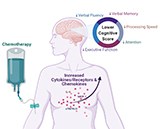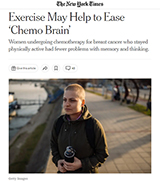Research Projects
 Characterization of cancer-related cognitive impairment in cancer patients and the psychoneuroimmunological impact of cancer treatments on cognitive function
Characterization of cancer-related cognitive impairment in cancer patients and the psychoneuroimmunological impact of cancer treatments on cognitive function
We currently have several longitudinal and cross sectional studies characterizing the trajectory of cognitive impairments in breast cancer patients, lymphoma and leukemia as well as understanding the etiological underpinnings of cancer-related cognitive impairments from psychological factors to cellular and molecular factors. Psychoneuroimmunological impacts of cancer and cancer treatments are a large focus of molecular research projects in this area as well as the impact of aging processes. We are interested in the effects of cancer and several treatments including: surgery, chemotherapy, radiation therapy, and hormonal therapy.
 Randomized clinical trials of the effects of exercise and anti-inflammatories on cognitive function in cancer patients
Randomized clinical trials of the effects of exercise and anti-inflammatories on cognitive function in cancer patients
We currently are conducting 2 randomized clinical trials of physical activity and anti-inflammatory medication interventions for their possible usefulness in alleviating cancer-related cognitive dysfunctions in breast cancer patients and gastrointestinal cancer patients. As part of these trials, we investigate possible mediating and moderating effects of biological factors on cognitive outcomes. This work was recently profiled in the New York Times and continues to offer meaningful insight into viable strategies that can alleviate negative side effects for patients with cancer.
 Translational mouse models of cancer-related cognitive impairment
Translational mouse models of cancer-related cognitive impairment
Investigating the impact of cancer and cancer treatments in murine models allows us to identify novel mechanisms that we aren’t able to investigate in people as well as to tease apart the impact of disease and cancer treatments on cognitive functions. Our current work in focused on understanding how cancer and chemotherapy impact neuroinflammation and memory capabilities in mice, and well as how availability exercise plays a role in shaping the immune response to cancer and cancer treatments.